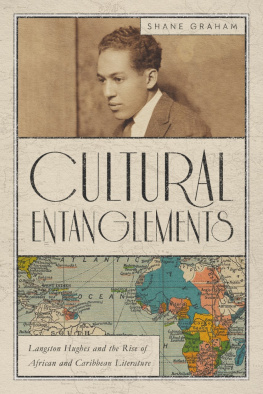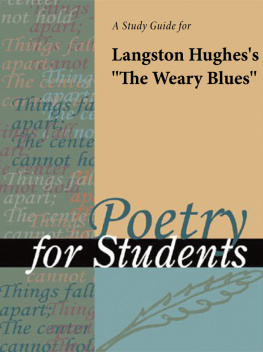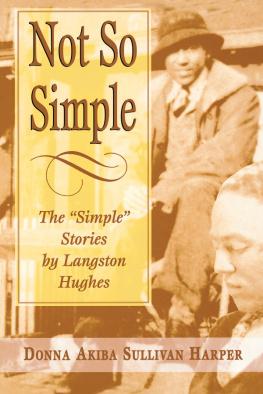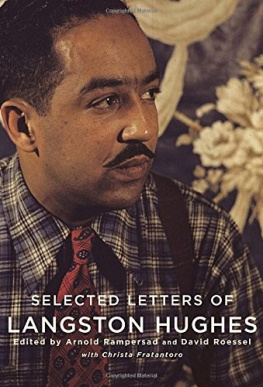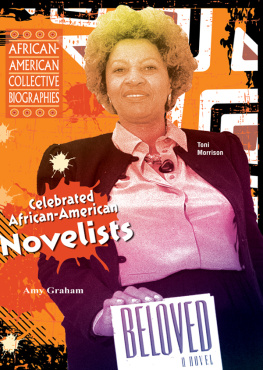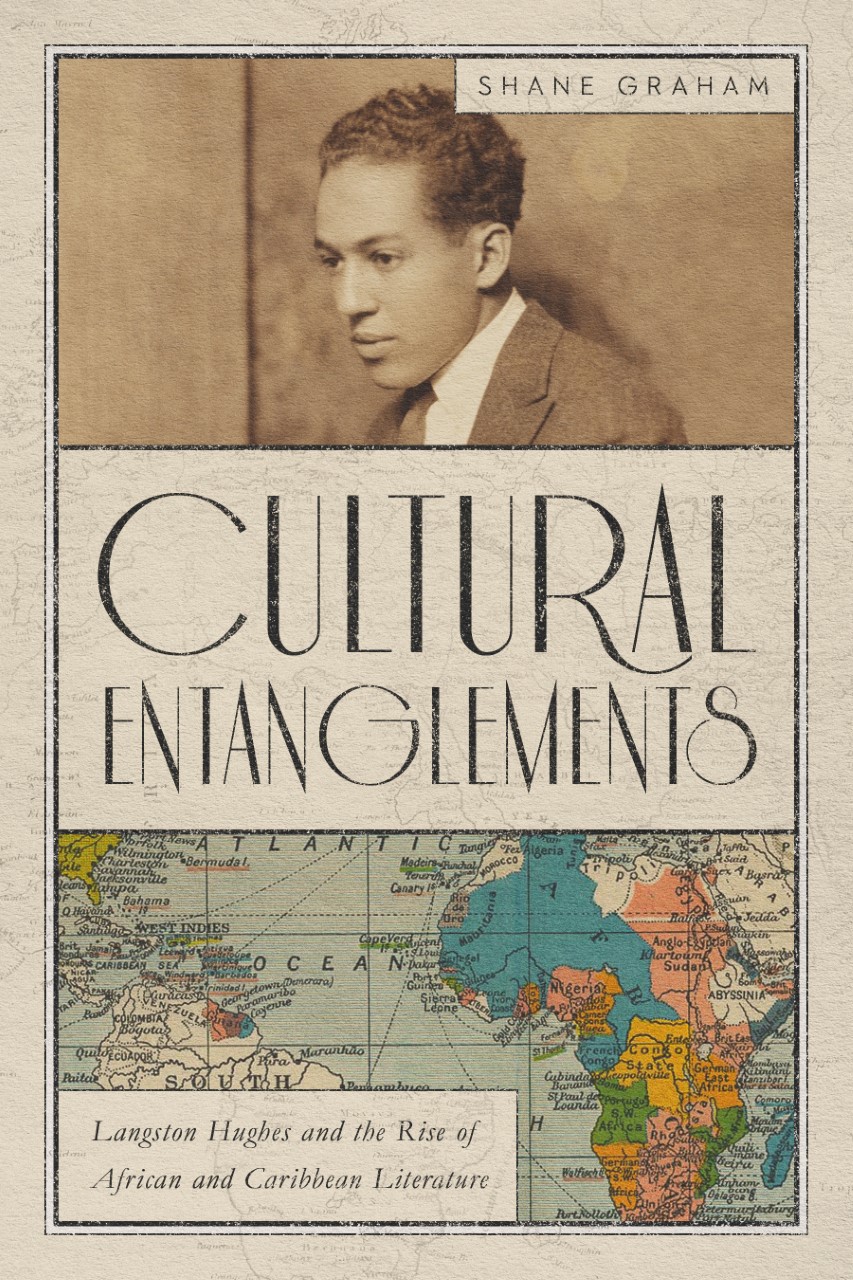Marlene L. Daut, Editor
Cultural Entanglements
Langston Hughes and the Rise of African and Caribbean Literature
Shane Graham
University of Virginia Press
Charlottesville and London
University of Virginia Press
2020 by the Rector and Visitors of the University of Virginia
All rights reserved
Printed in the United States of America on acid-free paper
First published 2020
9 8 7 6 5 4 3 2 1
Library of Congress Cataloging-in-Publication Data
Names: Graham, Shane, 1970 author.
Title: Cultural entanglements : Langston Hughes and the rise of African and Caribbean literature / Shane Graham.
Description: Charlottesville : University of Virginia Press, 2020. | Series: New World studies | Includes bibliographical references and index.
Identifiers: LCCN 2019035410 (print) | LCCN 2019035411 (ebook) | ISBN 9780813944098 (hardcover) | ISBN 9780813944111 (paperback) | ISBN 9780813944104 (epub)
Subjects: LCSH: Hughes, Langston, 19021967Criticism and interpretation. | Hughes, Langston, 19021967Friends and associates. | Caribbean literature20th centuryHistory and criticism. | Caribbean literatureBlack authorsHistory and criticism. | African literature20th centuryHistory and criticism. | African literatureBlack authorsHistory and criticism. | Pan Africanism in literature. | Literature and transnationalism. | Hughes, Langston, 19021967Influence.
Classification: LCC PS3515.U274 Z6435 2020 (print) | LCC PS3515.U274 (ebook) | DDC 818/.5209dc23
LC record available at https://lccn.loc.gov/2019035410
LC ebook record available at https://lccn.loc.gov/2019035411
Cover art: Langston Hughes, 1924 (Photographs of Prominent African Americans, James Weldon Johnson Collection, Yale Collection of American Literature, Beinecke Rare Book and Manuscript Library); The World: Colonial Possessions and Commercial Highways, The Cambridge Modern History Atlas, Cambridge University Press, London, 1912 (Perry-Castaeda Library Map Collection, University of Texas Libraries, The University of Texas at Austin)
Contents
I N 2004, while still writing my first book during a postdoctoral fellowship at Wits University in Johannesburg, South Africa, I began to think ahead to a possible second book on African and Caribbean coming-of-age narratives. I even began to explore the archival resources that might inform such a project during a visit to the National English Literary Museum (NELM) in Grahamstown. But something I came across in the Richard Rive papers sent me in a very different direction: photocopies of letters that Rive had written to Langston Hughes between 1954 and 1966 piqued my interest in midcentury cultural exchange between South Africa and the United States. (I later learned that David Chioni Moore had been instrumental in arranging for NELM to obtain the photocopies.) Further investigation revealed that NELM also had copies of letters written to Hughes by Peter Abrahams, Eskia Mphahlele, Bloke Modisane, and several other important writers from South Africa. Moreover, the originals, along with carbon copies of Hughess side of the correspondence, were all archived at the Beinecke Rare Book and Manuscript Library at Yale University.
I was thus inspired to dive deeper into this web of connections, and in 2007 I spent two weeks in New Haven with the help of a New Faculty Research Grant from Utah State University. I brought back microfilms containing reproductions of Hughess correspondence, not just with the South African writers but also with writers throughout Africa and the Caribbean, some of it going back to the early 1920s. I recruited a very smart and capable undergraduate student, John Walters, to help me edit the letters between Hughes and the South African writers. The resulting volume, entitled Langston Hughes and the South African Drum Generation: The Correspondence, was published by Palgrave Macmillan in 2010.
While I initially focused on Hughess connections to South Africa, I never forgot that he also corresponded at least briefly with some of the major black twentieth-century writers in English, French, and Spanish from Africa and the Caribbean, among them Aim Csaire, J. P. Clark, Lon-Gontran Damas, Nicols Guilln, George Lamming, Claude McKay, Regino Pedroso, Jacques Roumain, Lopold Senghor, and Wole Soyinka. The more I investigated these materials and the existing scholarship on Hughes, the more I realized that with a few exceptions, scholars have made little account of the relationships represented in these letters, of those relationships influence on the rise of colonial and postcolonial literatures throughout the African world, or of their effect on Hughess own literary output throughout his career.Pedroso, Jacques Roumain, Lopold Senghor, and Wole Soyinka. The more I investigated these materials and the existing scholarship on Hughes, the more I realized that with a few exceptions, scholars have made little account of the relationships represented in these letters, of those relationships influence on the rise of colonial and postcolonial literatures
I therefore plunged further into the rich archival troves that surround many of these writers when I was granted a sabbatical by USU in 201112. This year of raw data gathering laid the groundwork for what became Cultural Entanglements. I was aided in this project by a Scholars-in-Residence award from the Schomburg Center for Research in Black Culture at the New York Public Library and an Alfred A. and Blanche W. Knopf Fellowship from the Harry Ransom Center at the University of Texas. I am grateful for their financial support as well as the endlessly helpful assistance of their staffs. Naomi Bland, my research assistant at the Schomburg Center, deserves special thanks for turning up a gold mine of material. I am also thankful for the help provided by the staffs at the Beinecke, NELM, and the many other archives I investigated, including the Centre for African Literary Studies at the University of KwaZulu-Natal, the Huntington Library, the Bibliothque Littraire Jacques Doucet at the Sorbonne, the Bibliothque Nationale de France, and the Archives Nationales in Pierrefitte-sur-Seine.
I particularly valued the community at the Schomburg Center as I conducted the preliminary research and began shaping the project. I am appreciative of all the scholars who participated in the weekly seminars during my time there: Giselle Anatol, Carolyn Brown, Lisa Collins, James De Jongh, Venus Green, Robin Hayes, Ryan Kernan, Esther Lezra, Kevin McGruder, Colin Palmer, Adrienne Petty, and Millery Polyne.
My gratitude and thanks go to everyone who provided advice, guidance, and/or helpful readings at various stages over the last fifteen yearsa process so long I will surely make some important omissions. Nevertheless, I must thank the following people: Rita Barnard, Lawrence Culver, Ronit Frenkel, Alexander Gil Fuentes, Lisa Gabbert, Stephen Gray, Kathleen Gyssels, Barbara Harlow, Keri Holt, Jean Jonassaint, Doug Jones, Bernth Lindfors, Brian McCuskey, Kristine Miller, Ryan Moeller, Monica Popescu, Stphane Robolin, Amrit Singh, Andrea Spain, Shaun Viljoen, John Walters, and David Watson.
I have taught many of the texts that I discuss in Cultural Entanglements in various courses over the years at USU. My students always humble me by showing me new ways of reading and thinking about the literature; my thanks to them for being rigorous respondents and sounding boards for so many ideas that ended up in the book. Thanks also to my colleagues in USUs remarkably collegial and supportive English Department.

